

SABIN CENTER FOR CLIMATE CHANGE


Zac Wolf

“ ”
In a time of profound challenge and transformation, the Sabin Center remains a hub of thought leadership, applied research, and engagement, framing the issues and driving impact across the field of climate law and policy.
Michael Burger Executive Director of the Sabin Center for Climate Change Law

Since its founding in 2009, the Sabin Center for Climate Change Law has worked to develop legal tools to combat the climate crisis and advance climate justice, and to train the next generation of leaders in the field. In 2024–2025, we expanded our work and impact, both domestically in the United States and internationally. We added to our team of climate law experts, hosted numerous events, published extensively, and engaged with government, nongovernmental, and private sector partners.
In early 2025, with the change in presidential administration, we developed a suite of new online tools to help keep track of federal action on climate change. The Climate Backtracker, launched on Inauguration Day 2025, records steps taken by the Trump-Vance administration to scale back or wholly eliminate federal climate change mitigation and adaptation measures. We also relaunched our IRA (Inflation Reduction Act) Tracker and Silencing Science Tracker to capture actions taken by the Trump administration for the purpose of undermining implementation of the IRA and interfering with climate and other scientific research.
This report highlights the Sabin Center’s breadth and impact across our program areas, including climate litigation, carbon management and negative emissions technologies, US climate policy, energy transition, climate law and finance
BY
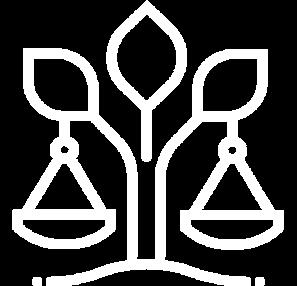
9 AMICUS BRIEFS


OUR TEAM
The Sabin Center has expanded its team to include 16 full-time attorneys in addition to the Faculty Director, Michael Gerrard; Executive Director, Michael Burger; and Deputy Director, Romany Webb, who work on a broad range of issues and initiatives within the climate law space. Our attorneys are supported by a dedicated group of student interns and externs.
Michael Gerrard
Faculty Director
The founder and faculty director of the groundbreaking Sabin Center for Climate Change Law and one of the foremost environmental lawyers in the nation, Michael Gerrard is an advocate, litigator, teacher, and scholar who has pioneered cutting-edge legal tools and strategies for addressing climate change. He writes and teaches courses on environmental law, climate change law, and energy regulation. He was the chair of the faculty of Columbia University’s renowned Earth Institute from 2015 to 2018 and now holds a joint appointment to the faculty of its successor, the Columbia Climate School.
Michael Burger
Executive Director
Michael leads a dynamic team that is at the forefront of domestic and international efforts to reduce greenhouse gas emissions and promote climate change adaptation through pollution control, resource management, land use planning, and green finance. Past and present projects involve collaborations with local and national environmental groups and government representatives, as well as international organizations such as the United Nations Environment Program, the United Nations Development Program, and the International Red Cross.
Romany Webb Deputy
Director
Romany Webb is deputy director of the Sabin Center for Climate Change Law. Romany also holds appointments as a research scholar at Columbia Law School, adjunct associate professor of climate at the Columbia Climate School, and senior advisor on climate science at the Columbia Graduate School of Journalism. Romany’s research focuses on two primary areas: (1) energy and (2) negative emissions technologies.
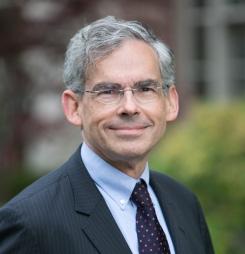
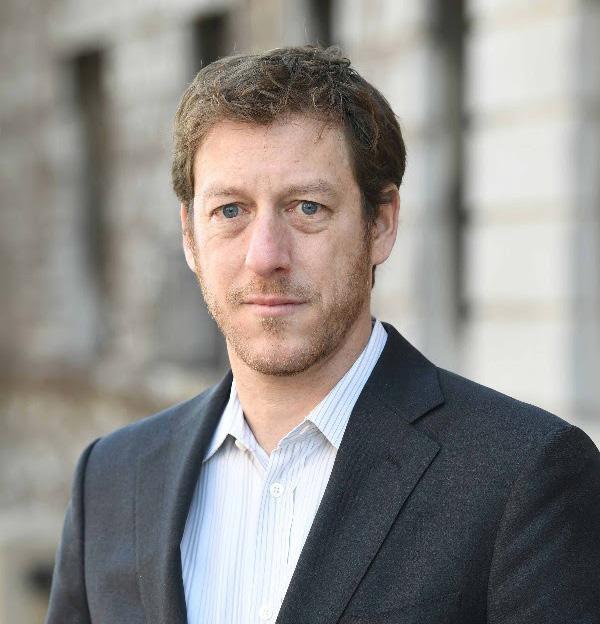
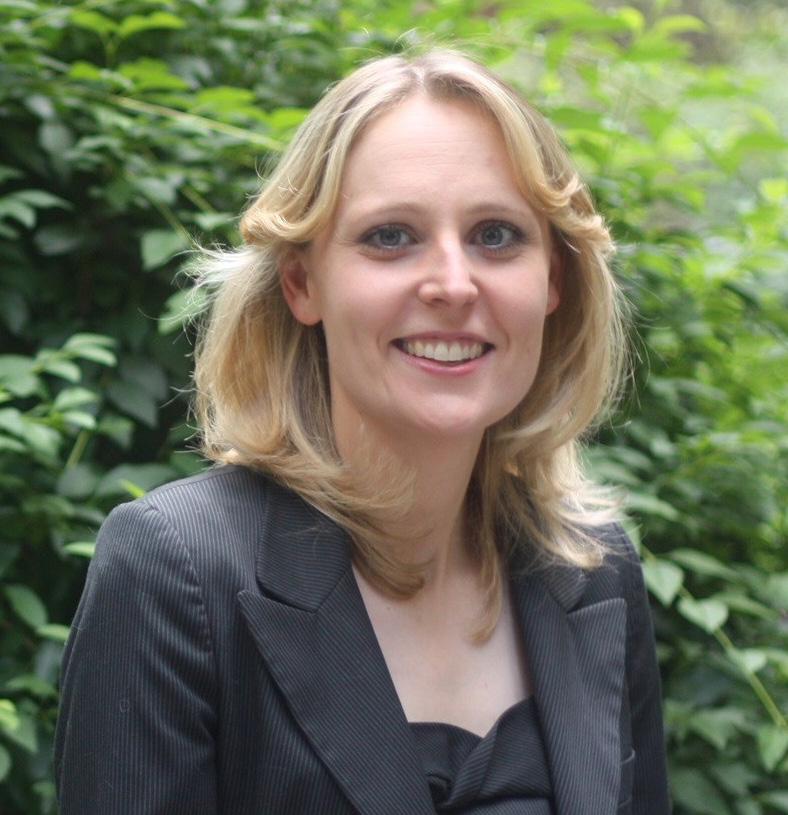
Michael Gerrard Faculty Director
MIchael Burger Executive Director
Romany Webb Deputy Director
CLIMATE LITIGATION AND INTERNATIONAL LAW
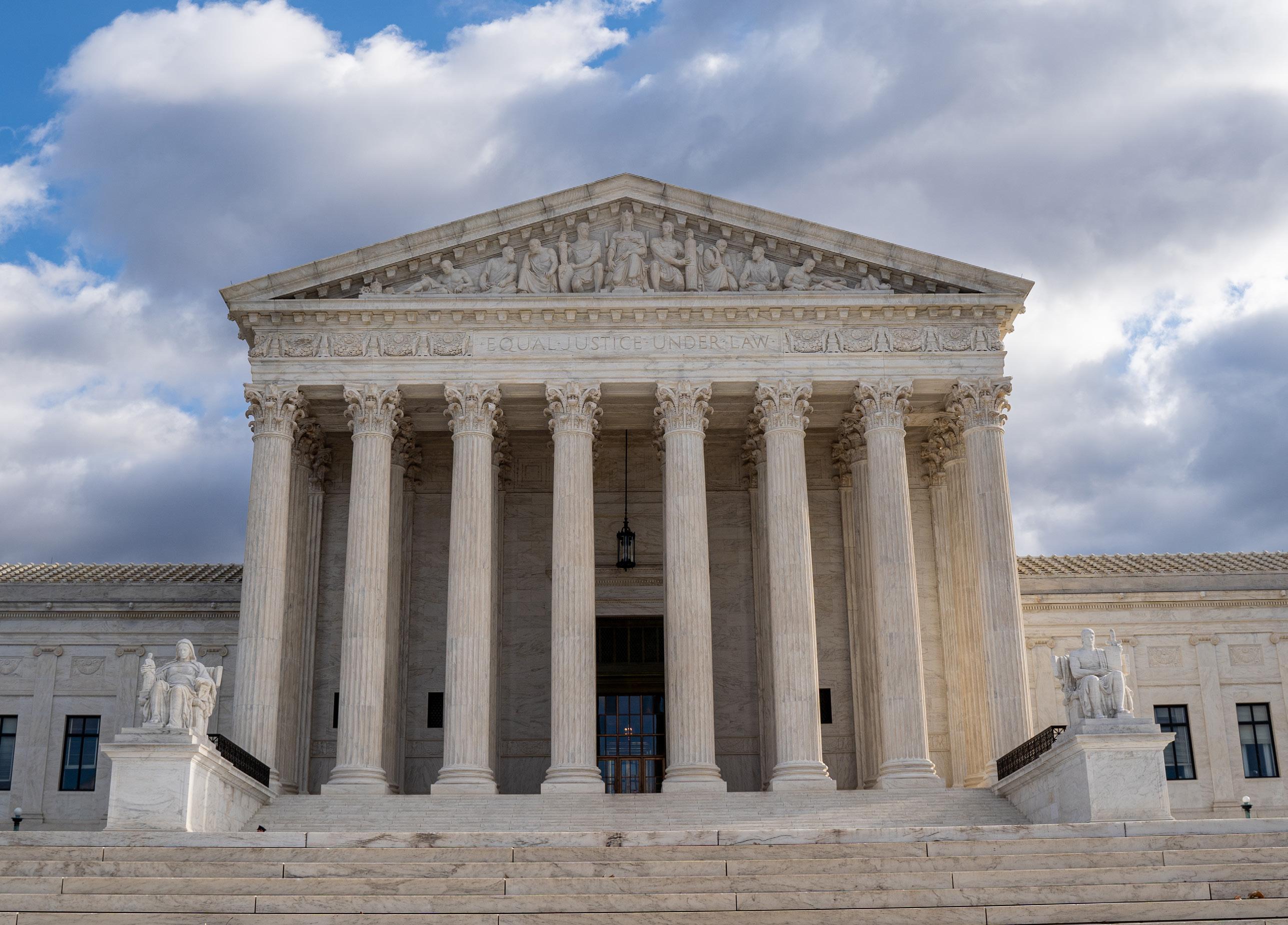
The Sabin Center provides independent scholarship and free access to resources for practitioners and researchers in the field of climate litigation. The Center has become a leader in tracking and analyzing US and global climate change cases through our databases. We continue to expand our Peer Review Network of Global Climate Litigation, composed of practitioners and scholars from around the world who ensure these databases are comprehensive and up-to-date. We engage with courts by submitting amicus briefs, participate in international hearings, and convene workshops and other events. The Center is proud to give an overview of its team’s impact on climate cases domestically as well as internationally.
Talks and Engagement
Sabin Center’s impact on US and international climate cases and human rights
Sabin Center Executive Director Michael Burger participated in a hearing in Barbados before the InterAmerican Court of Human Rights, in connection with the Court’s process toward issuing an advisory opinion on state obligations to address climate change. Relatedly, the Sabin Center published a report summarizing amicus briefs submitted to the Court.
Within the United States, the Sabin Center filed amicus briefs in a number of key climate cases, including in support of Environmental Protection Agency regulations, and New York City’s Local Law 97—a law designed
to reduce greenhouse gas emissions from large buildings.
The Sabin Center team gave numerous talks on climate litigation: Faculty Director Michael Gerrard delivered keynote addresses at the 51st Annual Wolfgang Friedmann Conference on International Law at Columbia Law School and at the 30th Tulane Law & Policy Summit. Other staff presented on topics such as corporate accountability, children’s rights, and climate migration, including at the Lara D. Gass Symposium on Children and Constitutions in the Anthropocene Era at Washington & Lee Law School and the American Regional Summit of the BIICL Global Toolbox. We also cohosted the Climate Change and Reparations International Conference at the University of Montreal and a workshop on implementation and impact of landmark climate cases.
RAPPORTEURS COVERING
198
JURISDICTIONS
(AS OF MARCH 2025)
Sabin Center staff also participated in international events where they engaged with governments, NGOs, and researchers on climate litigation–related topics. Among other events, staff presented at a regional meeting of Southeast Asian National Human Rights Institutions in Quezon City, Philippines; at a workshop on climate litigation in Brazil held in Rio de Janeiro, Brazil; and at the China National Environmental Judges Training and International Workshop on Environmental Rule of Law and Green Development in Beijing and Chengdu, China, hosted by the Supreme People’s Court, the UN Environment Programme, and ClientEarth. 175
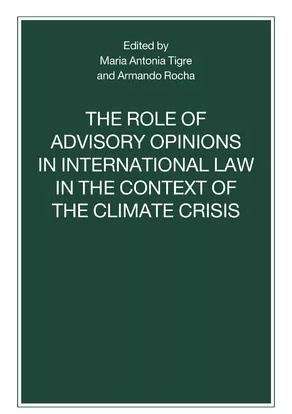
Publications and Other Resources
Webinar series on international climate litigation
The Sabin Center and Verfassungsblog published two joint blog symposiums on key climate decisions from the European Court of Human Rights and on the Advisory Opinion for Climate Change and International Law from the International Tribunal for the Law of the Sea (ITLOS). The Sabin Center also hosted webinars in which experts delved into the implications of the ITLOS’s advisory opinion with respect to states’ obligations under international law
Reports
• Conference Report: Attribution Science and Climate Law, by Jessica Wentz (March 2025)
• Climate Change in the Courts: A 2024 Retrospective, by Maria Antonia Tigre and Margaret Barry (January 2025)
Books
• The Role of Advisory Opinions in International Law in the Context of the Climate Crisis, edited by Maria Antonia Tigre and Armando Rocha (Forthcoming)
• Brazil and Climate Justice: Pioneering Climate Litigation for a Global Cause, edited by Maria Antonia Tigre, Armando Rocha, and Délton Winter de Carvalho (Forthcoming)
• Climate Litigation and Vulnerabilities: Global South Perspectives, edited by Maria Antonia Tigre, Melanie Jean Murcott, and Susan Ann Samuel (available for pre-order on June 9, 2025)
Other publications
• Climate Change Litigation In New York, by Michael B. Gerrard, New York Law Journal (March 2025)
• Climate Litigation in the Global South: Mapping Report, by Maria Antonia Tigre (July 2024)
• Public Health and Human Health Implications of Climate Mobility, by Julia Neusner and Ama Francis (June 2024)
New Resource for Tracking Climate Litigation
In March 2025, the Sabin Center launched a newsletter dedicated to covering its climate litigation work. The newsletter, which is issued twice a month, includes highlights of (and links to) the latest updates to the U.S. and Global Climate Change Litigation Databases. It also features the Center’s litigation-focused blog posts and other publications, as well as upcoming events on litigation-related topics and spotlights on contributors from the Peer Review Network of Global Climate Litigation.

AND CLIMATEREGULATION FINANCE AND REGULATION
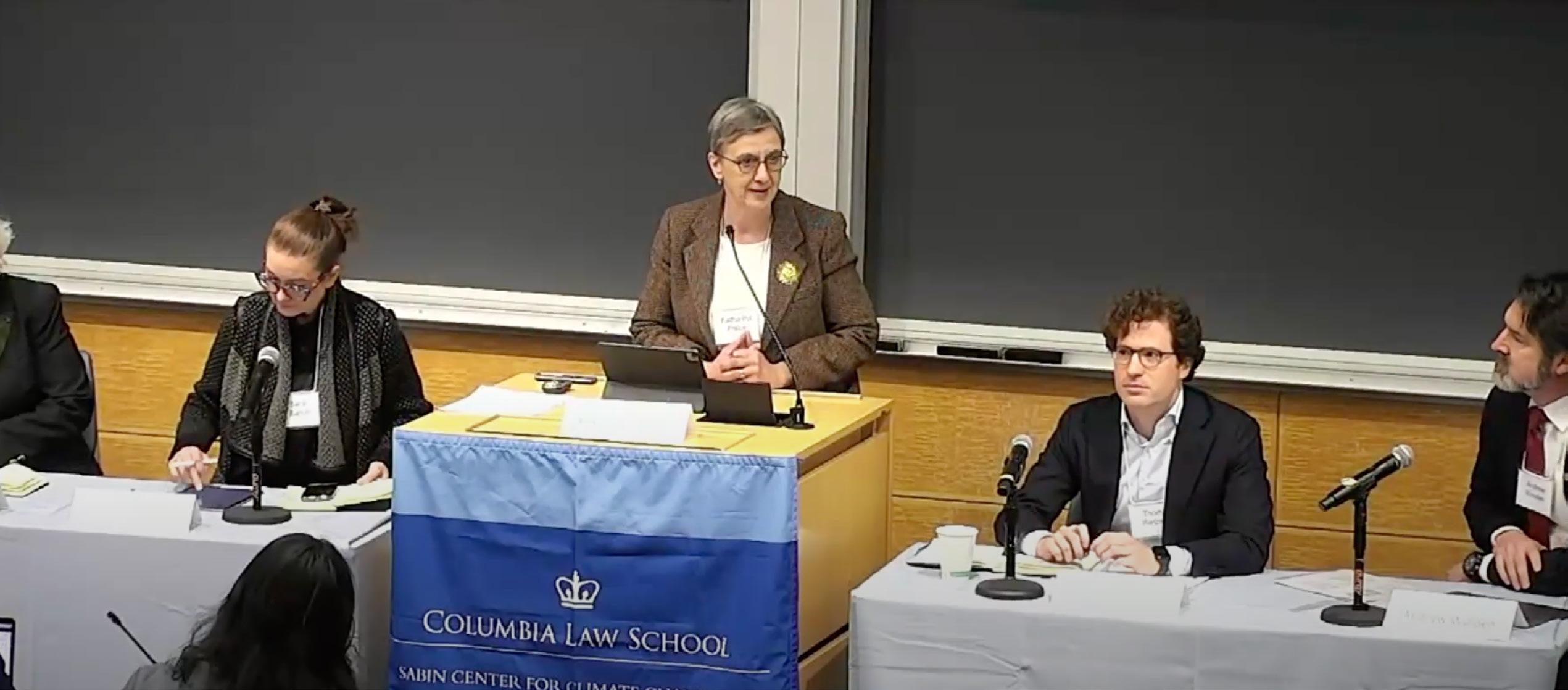
The Sabin Center develops and supports financial law efforts to manage the impacts of climate change on markets and to mitigate the economic and societal harms of climate change. Through the Initiative on Climate Risk and Resilience Law and the Climate Law and Finance Initiative, the Sabin Center monitors global trends in climate-related financial regulation, with a particular focus on US federal and state efforts. We also track and analyze developments in other legal fields that intersect with climate-related financial regulation, including antitrust law, administrative law, and First Amendment law.
Talks and Engagement
• The Sabin Center has been highly active in ongoing regulatory proceedings before the Securities and Exchange Commission and other federal financial regulators. We have also engaged with relevant state regulators, including submitting a comment letter in response to California Air Resources Board’s Information Solicitation seeking feedback to inform its work developing implementation regulations for California’s climate disclosure law, SB 253 and SB 261, both as amended by SB 219.
The Sabin Center and Millstein Center for Global Markets and Corporate Ownership at Columbia Law School, in partnership with ECGI, hosted a legal colloquium at Columbia Law School, exploring areas for future research and action around climate-related fiduciary duties. This convening brought together approximately 300 participants who explored whether, and how, corporate directors and officers are obligated to respond to climate change.
Legal Colloquium: The New Climate Fiduciaries
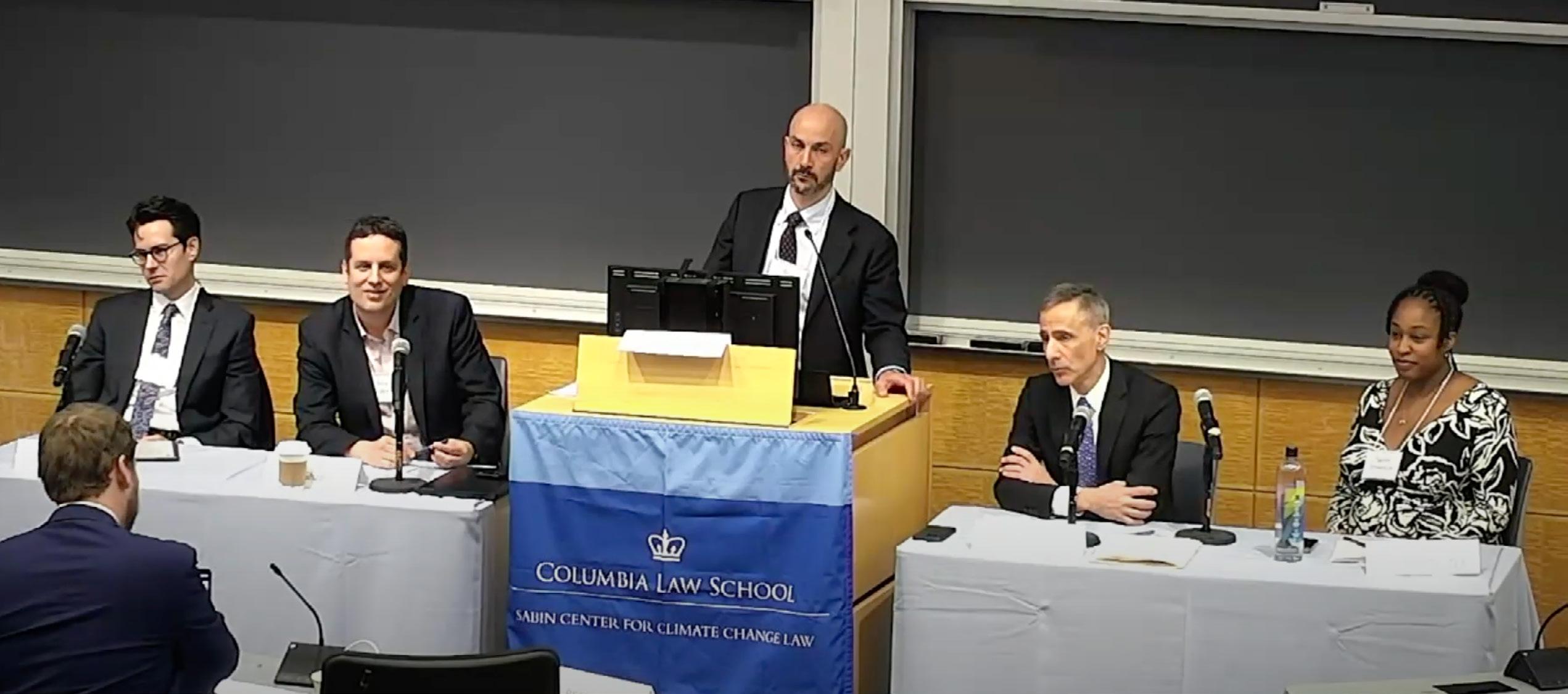
The Sabin Center and Columbia Center on Sustainable Investment organized an industry workshop on bank-client climate engagement, and members of our team spoke at the 2025 UC Berkeley Climate & Business Summit and participated in several sessions of the Finance in Common Summit in Capetown, South Africa.
Publications
• Texas v. BlackRock Puts the Common Ownership Theory on Trial, with Implications across the Financial Sector and Collaborative Sustainability Efforts, by Cynthia Hanawalt and Denise Hearn (Spring 2025), in the Special Issue of the International Journal for Financial Services (Revue Internationale des Services Financiers): Financial Regulation & Climate Change (forthcoming June 2025)
• Shedding Light on Climate Risk in 2025: Upcoming Debates About the SEC’s Climate Disclosure Rule, Andrew Bernstein, Cynthia Hanawalt, Lisa Sachs, and Chloe Field (November 2024)
• Sabin Center Senior Fellow Ilmi Granoff helped develop a series of primers on Transition Planning for the World Business Council for Sustainable Development over late 2024 and early 2025 and is a contributing author to a report on the global state and future of green banks, which is to be launched at the World Bank Spring meetings
Legal Colloquium: The New Climate Fiduciaries
CARBON MANAGEMENT AND NEGATIVE EMISSIONS
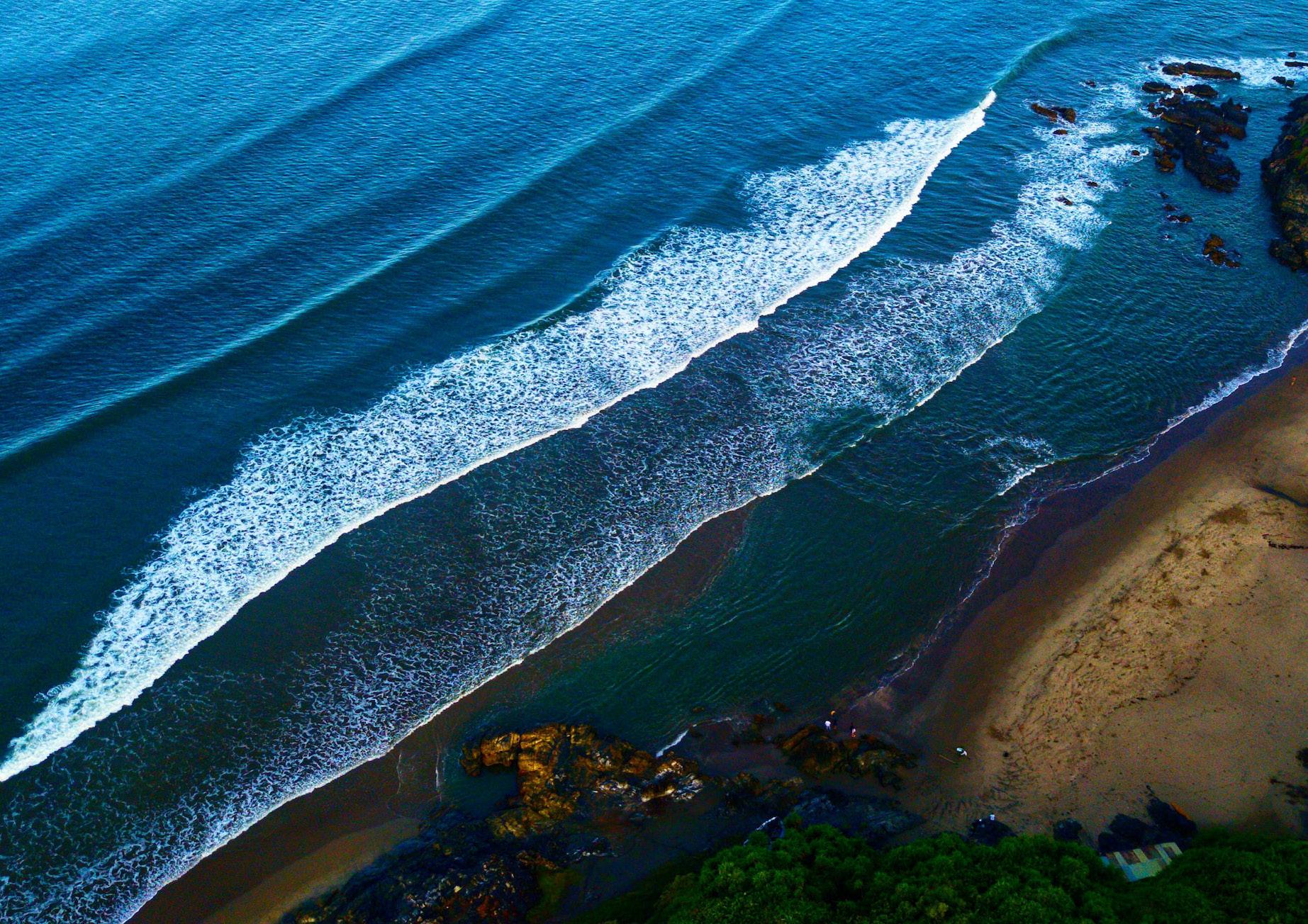
The Sabin Center conducts research on legal issues associated with the development and use of carbon management and negative emissions technologies. Over the past year, the Center has continued to play a leading role in efforts to analyze and develop legal frameworks for carbon dioxide removal and has conducted groundbreaking research in the emerging field of atmospheric methane removal.
Talks and Engagement
The Sabin Center engaged with US government bodies on a range of carbon dioxide removal–related topics, including submitting comments to a federal interagency committee reviewing marine carbon dioxide removal (here) and the permitting of marine carbon dioxide removal projects (here and here).
Sabin Center Deputy Director Romany Webb contributed to several international efforts to improve understanding of the existing governance framework for marine-based carbon dioxide removal and the need for governance reforms, including coauthoring a “Blue Paper” for the High-Level Panel for a Sustainable Ocean Economy and contributing to the United Nations World Ocean Assessment. Webb also testified before the Senate of Canada Standing Committee on Fisheries and Oceans at a hearing on the legal aspects of marine carbon dioxide removal and gave keynote addresses at a number of major international conferences, including the 56th International Liege Colloquium in Brussels, Belgium, and the One Ocean Science Congress in Nice, France.
The Sabin Center team also presented on legal issues relating to carbon dioxide removal and methane removal at several other high-profile events, including Capitol Hill Ocean Week, the OCEANS Halifax Conference, and AGU 24.
Publications
• Regulation of Seaweed Cultivation and Sinking for Carbon Dioxide Removal in Alaska, by Ashwin Murthy, Korey Silverman-Roati, and Romany M. Webb (April 2025)
• Liability Considerations for Marine Carbon Dioxide Removal Projects in U.S. Waters, by Korey Silverman-Roati, Martin Lockman, and Romany M. Webb (March 2025)
• Regulation of Ocean Alkalinity Enhancement in Washington State, by Ashwin Murthy, Korey Silverman-Roati and Romany M. Webb (January 2025)
• Removing Methane via Soil Amendments: The Legal Framework, by Korey Silverman-Roati and Romany M. Webb (December 2024)
• Legal Considerations for Atmospheric Methane Removal, by Korey Silverman-Roati and Romany M. Webb (October 2024); this report was commissioned by the National Academies of Sciences, Engineering, and Medicine
• Removing Methane via Atmospheric Oxidation Enhancement: The Legal Framework, by Romany M. Webb, Martin Lockman, and Korey Silverman-Roati (July 2024)

The Sabin Center’s Cities Climate Law Initiative engages with cities, nonprofit organizations, and city-focused associations pursuing ambitious climate action. In 2025 we have assisted these and other groups in understanding and navigating the changes in federal climate laws and programs brought by the new administration. We have also focused on developing our work with the Smart Surfaces Coalition, which develops and tracks legal and policy tools to advance the use of smart surfaces—a group of technologies and design strategies that mitigate the effects of climate change in urban environments—especially extreme heat, stormwater flooding, and poor air quality.
Talks and Engagement
Inflation Reduction Act Implementation
The IRA Tracker, developed by the Sabin Center and Environmental Defense Fund, has tracked implementation of the Inflation Reduction Act (IRA) since its passage in 2022. With the change in presidential administration, we expanded the tracker to include new information about efforts to undermine IRA programs, and related litigation. We have also published a series of reports and blogs identifying at-risk programs, analyzing the legality of Trump administration attacks on them, and exploring possible response strategies (see here and here, for example).
Members of the Sabin Center team gave numerous talks and briefings on IRA implementation, including for America Is All In, Climate Mayors, the Urban Sustainability Directors Network, and C40.
Other Engagement
Sabin Center staff spoke about cities’ role in addressing the climate crisis at numerous conferences and symposiums, including the Charging Ahead symposium at UCLA’s Emmett Institute on Climate Change and the Environment, in Spring 2025. They also discussed ways to
support local climate initiatives at a “pro bono bootcamp” for lawyers interested in doing climate change work, among other efforts.
Publications and Other Resources
• Wildfire Smoke and U.S. Law, by Michael B. Gerrard, Columbia Journal of Environmental Law (April 2025)
• “Time for States to Flex Their Legal Muscles,” by Michael B. Gerrard, Environmental Forum (March/April 2025)
• Environmental Law in Trump’s Second Term, by Michael B. Gerrard, New York Law Journal (November 12, 2024)
• Implementing the Inflation Reduction Act: Progress to Date and Risks from a Changing Administration, by Romany M. Webb, Martin Lockman, and Emma Shumway (September 2024)
• New York Falling Behind in Implementing Bold Climate Law, New York Law Journal (September 12, 2024)
• Cities, E-Commerce & Public Health: 3 Legal Pathways to Limiting Freight Vehicle Emissions, by Amy Turner (June 2024)
The Sabin Center launched the Smart Surfaces Policy Tracker, a publicly available database containing over 460 pieces of law and policy relating to smart surfaces, including zoning and building codes and procurement policies.
The Sabin Center will be launching another online resource in June 2025: the Cities Climate Law Toolkits. These toolkits will provide background research and analysis on state-local preemption issues to educate city staff, attorneys, local advocates, and additional stakeholders on opportunities for local climate action

PROJECTS TO ADVANCE THE CLEAN ENERGY TRANSITION
The Sabin Center develops legal tools to drive the clean energy transition. Our Renewable Energy Legal Defense Initiative (RELDI) works with local residents, community groups, and public interest organizations to advance renewable energy projects, such as solar projects in states like Ohio, Michigan, and Rhode Island. The Center also works to advance decarbonization efforts through its Model Climate Laws Initiative
RELDI
The RELDI team filed two amicus briefs in litigation concerning the Revolution Wind Project off Rhode Island and supported various solar and wind projects in Ohio, Michigan, and New York.
RELDI also submitted comments to the New York Power Authority on how it can support achievement of the state’s climate goals and to the Michigan Public Service Commission on renewable energy siting.

Talks and Engagement
The Sabin Center has hosted several events on energy-related topics, including a webinar titled “Transmission & Interconnection Crises Blocking New York’s Climate Goals,” which featured speakers from industry groups and the New York Public Service Commission; and a presentation on community benefits agreements at the Annual Conference of the New York Battery and Energy Storage Technology Consortium in Albany, New York.
Members of the Sabin Center team also gave numerous talks on topics including state-level energy permitting reforms, challenges associated with developing transmission infrastructure and interconnection, the use of community benefits agreements in connection with renewable energy and battery storage projects, and legal interventions in the siting process. The team also led a workshop on legal strategies for success at a convening on renewable energy siting hosted by the Energy Foundation in St. Paul, Minnesota.
Publications
• Rebutting 33 False Claims to Solar, Wind, and Electric Vehicles, by Matthew Eisenson et al April 2024 (updated October 2024) which has
been downloaded 19,559 times (as of April 2025)
• Opposition to Renewable Energy Facilities in the United States: June 2024 Edition, by Matthew Eisenson and Jacob Elkin (June 2024); this spring, RELDI will be publishing an update to this annual report
Model Climate Laws Initiative
In June, the Sabin Center and the nonprofit group Environmental Advocates NY announced the “Model Climate Laws Initiative,” which is built upon the formerly named Legal Pathways to Deep Decarbonization in the United States project. This initiative is drafting state laws for state legislatures to tackle climate change, and assisting with the implementation of the laws. The project website, lpdd.org, already has more than 2,500 model and actual laws and other resources.
HIGHLIGHTED LEGAL TOOLS
The Sabin Center maintains 15 publicly accessible databases, trackers, and other online resources
Two new tools launched in 2024: the Smart Surfaces Policy Tracker and the RELDI Resource Bank
You can visit our full list of Resources here.
One new tool launched in 2025, the Climate Backtracker; and two existing tools relaunched in 2025: the Silencing Science Tracker and the Inflation Reduction Act Tracker
AWARDS AND RECOGNITION
Sabin Center Faculty Director Michael Gerrard was honored with a Lifetime Achievement Award at the Section of Environmental, Energy, and Resources’ 32nd Fall Conference in Seattle.
Sabin Center Fellow Andrew Fitch won second place at the William R. Ginsberg Memorial Essay Contest, for the 2024 New York State Bar Association Environmental & Energy Law Section
The Sabin Center was a winner of the 2024 Sea Grant Law and Policy Journal Symposium Competition
The Sabin Center was featured in Columbia Law School’s Academic Focus Series, highlighting its accomplishments and impact under Michael Gerrard and Michael Burger’s dedicated leadership.
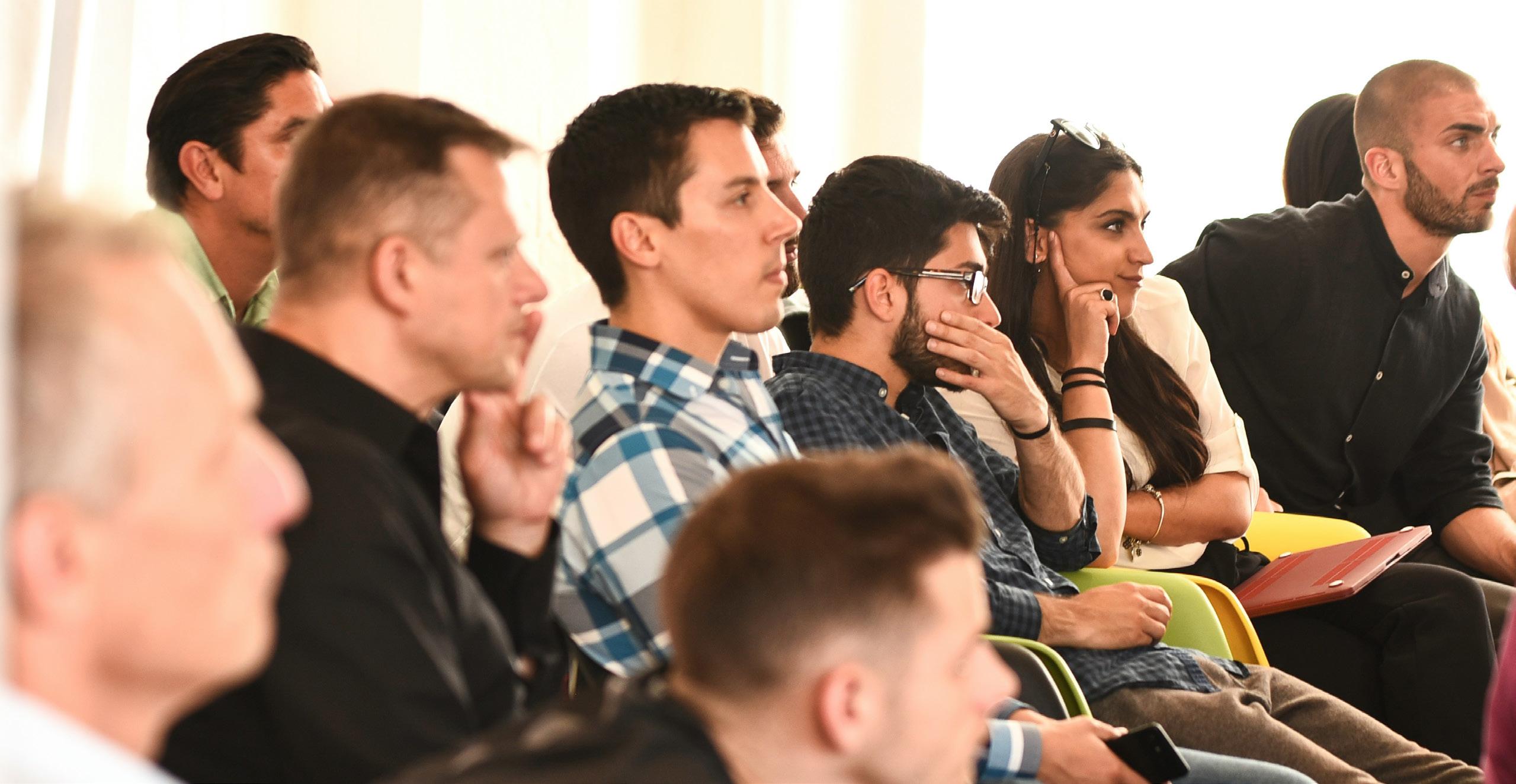
EVENTS
The Sabin Center hosted or cosponsored over 25 in-person events, conferences, and webinars in 2024–2025, including several NYC Climate Week events Examples include:
• Attribution Science and Climate Law Conference
• Dismantling Injustice: Advocacy Tools to Fight Pollution and Protect Community Health, a webinar cohosted with WE ACT for Environmental Justice, in which Michael Gerrard and Olivia Guarna presented the new community advocacy resources
• Food and Water in a Warming World: Agriculture, Climate Change, and Environmental Law
• Legal Colloquium: The New Climate Fiduciaries
* Litigating the Climate Crisis: Global Perspectives
• Lunchtime Talk with David Spence
• Maximum Threat: Sea-Level Rise and the Fate of the SIDS
• New York Environmental Law Year in Review 2023
• Same-Day Discussion on the SEC’s Final Climate Disclosure Rule
• Science, Society, and Sustainability – Closing the Knowledge-Action Gap
• The Fifth Annual Earth Day Climate Change Symposium
• The Fight for Climate Justice and Our Rights to a Safe Future
• Launch of the Special Issue on Climate Litigation in the Chinese Journal of Environmental Law
• Twelfth Annual Sabin Colloquium on Innovative Environmental Law Scholarship
• Webinar: Climate Litigation and Future Generations
• What’s Next for Corporate Climate Disclosure?
CLIMATE SCHOOL MISSION STATEMENT
• Michael Gerrard and Romany Webb continue to collaborate with David Goldberg at Lamont-Doherty Earth Observatory on research related to offshore carbon sequestration, including participating in the Solid Carbon Project. In March 2025, the project was awarded $24 million in funding through the Canadian Government’s New Frontiers in Research Fund.
• Michael Burger and affiliated researcher Jessica Wentz continue to work with Radley Horton, professor at the Columbia Climate School, on the interdisciplinary research project The Law and Science of Climate Change Attribution.
The core mission of the Sabin Center is to develop and promulgate legal techniques to combat the climate crisis and advance climate justice, and to train the next generation of lawyers who will be leaders in the field. The Sabin Center is both a partner and a resource for public interest legal institutions engaged in climate change work. Further, the Center addresses a critical need for the systematic development of legal techniques to fight climate change and the compilation and dissemination of information for lawyers in the public, private, and NGO sectors
Columbia Law School is specially situated to make fundamental contributions to the development of the legal structures needed to address climate change. As one of the world’s preeminent law schools, its faculty has unsurpassed depth in the many legal disciplines that must be harnessed to address the critical issue of climate change. This initiative benefits from great synergies with the school’s other centers and programs within the Law School and around Columbia University.
Footnote: We extend special gratitude to the faculty, staff, and students who all contribute tirelessly to shape our work in these key areas. We also thank our generous funders and the Columbia Law School and Columbia Climate School, who each ensure our vital work continues.

LOOKING AHEAD
We look forward to continuing to expand our work, to increase our impact, and to grow our team this coming year!
Information on ways to support our work in advancing climate action is available at climate. law.columbia.edu/content/support-us.
Join our mailing lists to stay up to date on the latest news in climate and energy law. You can also follow us on our social media platforms, where we are highly active—Bluesky, LinkedIn, YouTube, and Instagram.
